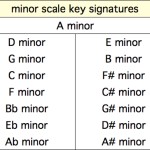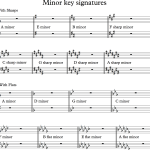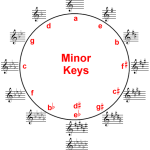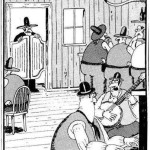I’m writing this blog primarily for people who, like me, don’t have musical training, but who do, like me, have a keen ear and some knowledge. No doubt those with expertise could pour cold water on what follows, but what the hell – it’s only my opinion!
Firstly, I’m taking it that you know the difference between music played in a major and a minor key, the key being the scale about which the piece is written. Let’s start with the following definition:
What is the difference between major and minor keys?
The difference between major and minor chords and scales boils down to a difference of one essential note – the third. The third is what gives major-sounding scales and chords their brighter, cheerier sound, and what gives minor scales and chords their darker, sadder sound.
That’s the critical bit: music in major key will generally sound happy and minor key will be tinged with a vaguely melancholy sound, often associated with ballads. Even if you did not know why, that is the reason for the mood of music being much greater than the sum of its notes. This does not mean music played in a minor key is any less attractive to our ears, quite the reverse. After all, it’s been done in movies for decades: when there is a sad moment in the film, the music reverts instantly to minor key.
This brings me on to my hypothesis:
Maybe 75% of the music that we enjoy listening to, that makes us sit up and take notice, remember and listen to, is written in a minor key. Furthermore, the hook line of the music will in the vast majority of cases comprise either a descending cadence, or a rising cadence finishing with a descending note.
Strangely enough, it was not the blues that enticed me to “sad music” – though by definition they are almost invariably in minor keys. I first started thinking about minor keys while listening to haunting Chopin piano music, many years ago. The vast majority of Chopin’s greatest works are written in minor keys, often C Sharp Minor and B Minor, and make extensive use of rising cadences followed by a pivotal declining finale. For example, check out here and here, contrasting with this example in a major key. The latter is technically amazing but simply not as indefinably satisfying to the ear.
However, this idea is equally true of any genre and pretty much any artist, however hard it is to define what makes the minor key so attractive to the ear. For example, one song I play often is Cathy Davey’s Holy Moly, which demonstrates the principle in so many ways: it is plainly written in a minor key and makes liberal use of declining final note on the line “I’m on the loose train now.” Another long-time favourite comes on my random selection: Distractions by Zero-7 – also a minor key.
So I checked out my Desert Island Discs collection, my top played iTunes tracks, the favourites selected on my car music collection, my favourite music everywhere, and the rule proved to be startlingly consistent: about 75% of the music to which I listen most commonly fulfils the criteria. I started to discuss this with friends, some of whom poo-pooed the idea, yet it did not take long to realise that their favourite music did indeed contain a high proportion of minor key ballads or bluesy numbers.
Some material was written for a major and would not sound right any other way – the whole of Paul Simon’s Graceland album springs to mind, replete with cheery melodies in major key. Interesting then to hear songs written in a minor key transposed to be in a major key (see here.) The mood changes entirely, to the extent that some sound distinctly odd (this is the original of Smells Like Teen Spirit), as indeed when songs in a major key (eg. YMCA original) are reworked to a minor key.
But minor key is the standard for many genres and artists. Can you imagine Pink Floyd playing Another Brick In the Wall in anything other than a minor key? Ever hear metal music played in a major? Not that many country & western songs either! And, as mentioned above, the blues is written specifically to be a sad lament.
Start to listen to your favourite tracks and you’ll see that a very high proportion are written in minor keys. It might need an expert to tell us why we prefer it though!









